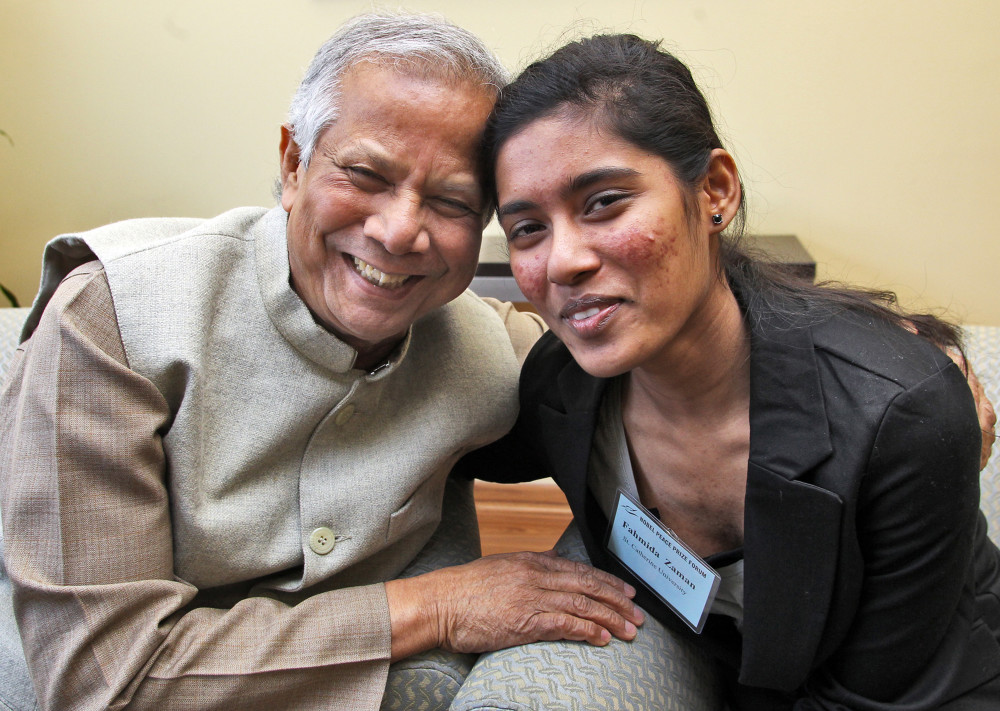By Thomas Lee
San Francisco Chronicle.
Muhammad Yunus, the founder of the global microfinance movement, is perhaps best known for winning the Nobel Peace Prize in 2006. But he also received the Presidential Medal of Freedom and the Congressional Gold Medal, two of the highest civilian honors in the United States.
Which is ironic, because Yunus thinks the American Dream — or at least key components of it — is kind of a sham.
Yunus has no problem with the principles of life, liberty, and pursuit of happiness. But he takes issue with the prevailing presumption that education and employment are prerequisites to those things.
“It’s the tyranny of employment,” Yunus told me during a recent event in San Francisco sponsored by Silicon Valley Bank. “Who said we have to be workers? They’re telling our children as we send them to school, work hard so you can get a good job. The teachers are telling ‘Work hard, get a good job. If you don’t get a job, you are a failure.'”
“You go to college, you come out with a certificate which employers value,” he continued. “They give you a better job, a kind of executive job rather than the ones given to people who struggle at the bottom. All the pride and everything is getting a good job. That’s all.”
It’s not the working that he objects to. It’s the idea that so many simply aspire to work for someone else.
For him, the idea of employment is the result of an artificial economic system that anoints the few as entrepreneurs and the rest of us workers. The philosophy goes to the heart of Yunus’ lifelong work in microfinance to combat poverty. Since 1997, Grameen Bank, the nonprofit financial institution he founded in Bangladesh, has lent billions of dollars to poor people, mostly women, to start their own businesses.
You might think this pro-entrepreneur ethos would especially appeal to this region. Indeed, the large crowd of young and upwardly mobile techies that gathered Saturday in a swanky event space in the Tenderloin treated Yunus like a rock star, applauding his every word and laughing at each joke.
But in truth, Yunus’ ideas are incompatible with Silicon Valley. By design, the venture capital model that underpins the tech industry picks winners and losers — and by default employers and workers — by deciding which startups to fund.
In a system of winners and losers, only a few of us can be entrepreneurs — the rest of us must drive cars for Uber or pick up dry cleaning as Task Rabbits. Silicon Valley might embrace egalitarianism in principle and spirit, but elitism forms the heart of our economic system.
Yunus, by contrast, believes everyone is an entrepreneur, whether he or she realizes it or not. The economy makes us think otherwise, he said.
In fact, in Grameen Bank, “We are not selecting people. We don’t reject anyone,” Yunus said.
“Some people tell me ‘Not all human beings are entrepreneurs,'” he said. “‘Some have that capability. Others do not have that capability.’ I say ‘Why do you say that? You distort them to make them workers. You already ruined them, giving their mind this idea of job.'”
Is a poor woman in Bangladesh who cleans people’s homes any less of an entrepreneur than Mark Zuckerberg? The only difference is that Facebook got millions of dollars in venture capital whereas the woman received a $5 loan from Grameen Bank to buy a vacuum cleaner and a mop.
The sad reality is that there is no such bank for poor people in America to start businesses, let alone open a savings and checking account.
Yes, some organizations, including Grameen, provide microloans in the United States. But the feds classify Grameen not as a bank but rather a nonprofit group, which limits the financial services it can offer.
“You have the banking law to create a bank for the rich, but you don’t have a banking law to create a bank for the poor,” Yunus said.
As a result, “owners become big, workers remain where they are or get worse,” he said. “If you don’t have a job, you are out of there. You are thrown to the cats. You’re not in the system at all. We need to address that in a systemic way.”














































































































































































































































































































































































